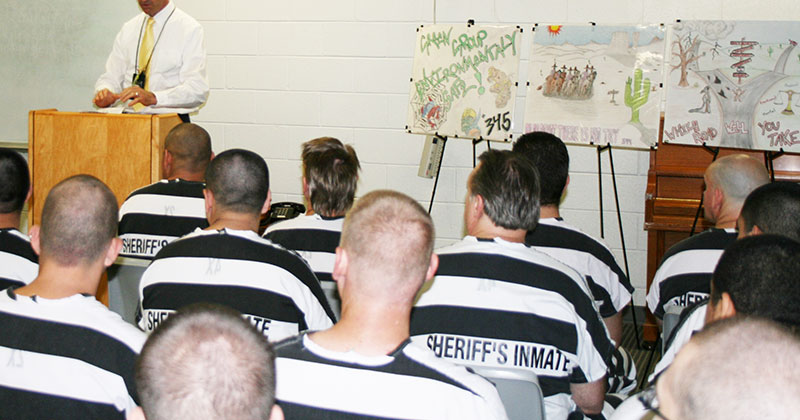DES Partners with Maricopa County ALPHA Rehabilitation Program
Justin Bruton sits quietly at a table across from a clinical supervisor in a classroom at the Durango Jail. Clean-cut with a baby face, the setting and the black and white striped jail uniform he wears are the only indications of the hard times he’s faced in his young life—a life he is working hard to change. Bruton is one of the newest graduates of the Maricopa County Sheriff’s Office (MSCO) ALPHA (Aware, Learn, Plan, Help and Accept) rehabilitation program for substance abusers. After his release in four days, he has a better life mapped out.

A Maricopa County Sheriff’s Captain addresses a class of ALPHA students.
(Photo courtesy of the Maricopa County Sheriff’s Office.)
"I want to get married, I want to have kids," said Bruton. "I told my mom, ‘This time, I’m not going to promise you anything. I’m just going to show you. I’m just going to show you’."
Bruton started using meth and heroin at age 21, and has been in and out of jail and prison for drug convictions in the eight years since. After every release, he always found himself back in the same neighborhood, with the same friends, using the same drugs. But this time, he vows things will be different, thanks in large part to the Arizona Department of Economic Security (DES) and its new role in the 20-year old ALPHA Program – getting inmates established healthcare before they’re released.
"This is a huge step," said Nancy Longtin, MSCO clinical supervisor. "Think about somebody who is stuck in addiction. In here, they’ve seen the psychiatrist, they’re properly medicated and they feel better sober. But they don’t have access to healthcare. When they’re released into the community, they don’t have a job, they don’t have support. It’s overwhelming and human nature is to go back to what [you] know. With this program, they’re signed up for AHCCCS [prior to being released]," she added.
"We were the final component they did not have before," said Stephen Williamson, Program Service Evaluator (PSE) with the Division of Benefits and Medical Eligibility’s (DBME) Family Assistance Administration (FAA). "They didn’t know who to contact, or they got a ‘no’."
The role DES plays begins with "assisters" from community partner Keogh Health Connection, who go into the jails about three weeks before graduation and help student inmates who previously had AHCCCS get reinstated. New applicants fill out the forms, and assisters enter the information into the Health-e Arizona Plus (HEAPlus) system. Williamson, who receives an encrypted email from the assisters via the HEAPlus system, manually overrides certain information so the system doesn’t automatically send an application to the inmate’s last address on record. The applications are then given a special caseload designation, and before the inmate is released, everything is processed, approved and transmitted to AHCCCS. If they’re on medication, their records can be sent to the clinic so the individual can continue their treatment. With this partnership, inmates are able make an appointment with a clinic before they even leave the jail.
While the ALPHA program is effective in teaching inmates important life skills, Longtin says 18 weeks just isn’t long enough to get to the core of their issues. They need continuing treatment, and judging by the growing number of participants, they want it. The Division of Benefits and Medical Eligibility (DBME) just completed its largest batch of applications to date—51—for a graduating class earlier this month. An estimated 80 percent of the jail population is there for crimes involving substance abuse, but with limited capacity in the ALPHA program, only a fraction are able to participate.
The program received national attention when it earned the 2016 National Association of Counties Achievement Award for Medicaid Application Services for Substance Using Jail Inmates. Estimates indicate recidivism rates are as low as 19 percent among ALPHA graduates, compared to more than 50 percent among non-graduates. DES is currently in talks with Pima County to see if some version of the program could be expanded there.
While the national recognition is appreciated by Williamson, his reward is helping the inmates find a new life. "They are human beings and deserve to be treated as such," says Williamson. "You were willing to help yourself become a better person, and I’ll be there 100% of the time to help you out."
By Connie Weber

